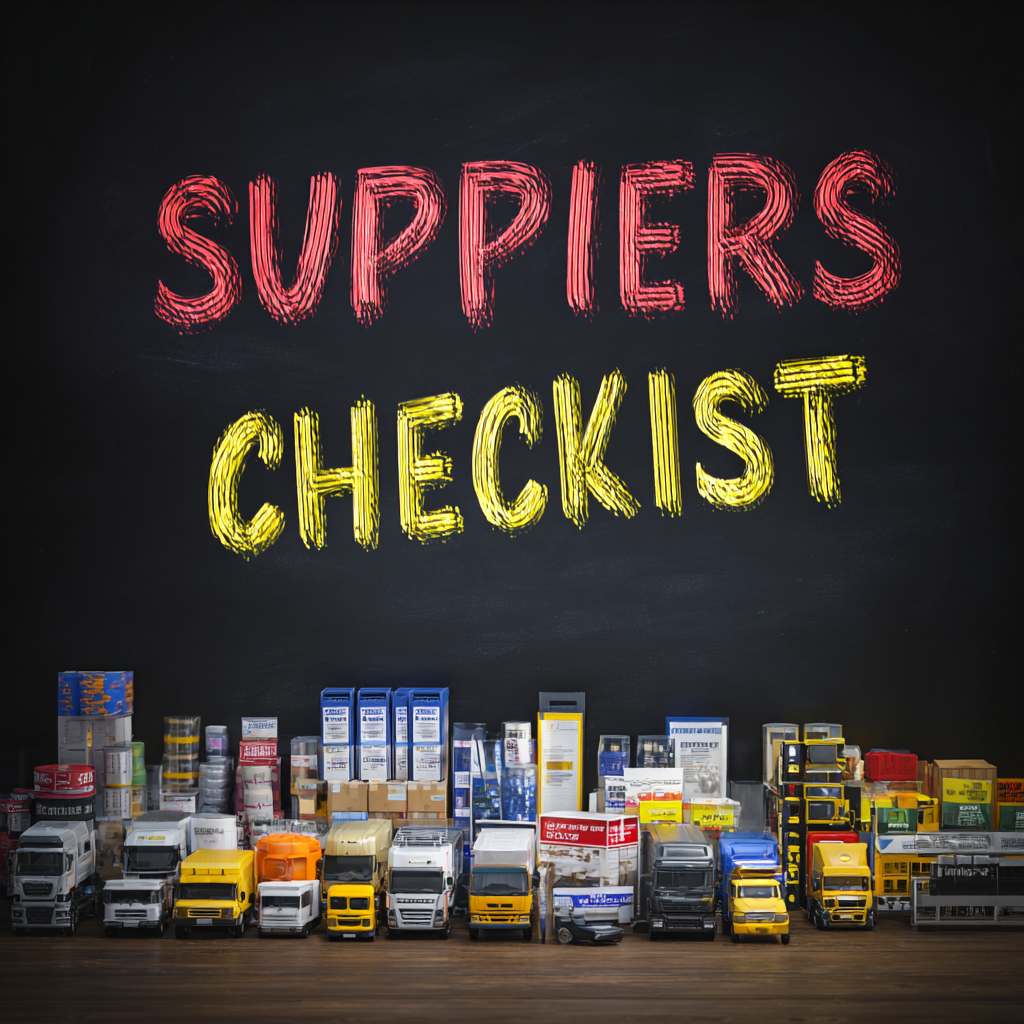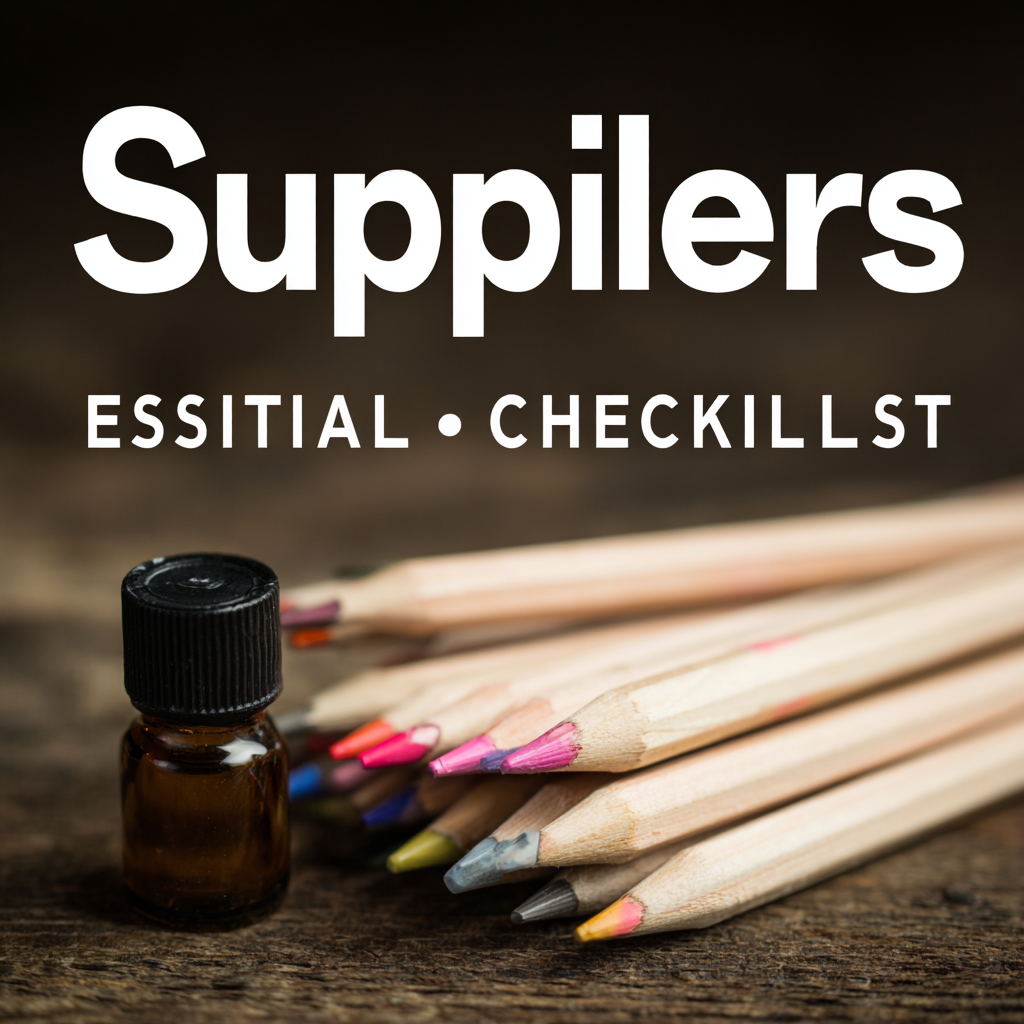
Ultimate Guide to Identifying Top Quality Suppliers with Essential Checklist
In today's highly competitive market, identifying top-quality suppliers is essential for businesses aiming to enhance their supply chain efficiency and overall performance. According to a recent report by Deloitte, around 79% of companies with a high-performing supply chain achieve revenue growth that exceeds the average within their industries. This underscores the critical role that suppliers play in driving business success. Moreover, a study from McKinsey highlights that businesses with strong supplier relationships can realize up to a 30% reduction in supply chain costs. However, with numerous options available, the challenge lies in discerning which suppliers truly meet industry standards and can deliver consistent quality. This ultimate guide provides an essential checklist designed to assist companies in recognizing those suppliers that not only fulfill their operational needs but also contribute to lasting competitive advantage.

Understanding the Importance of Quality in Supplier Selection
When it comes to selecting suppliers, the importance of quality cannot be overstated. According to a study by the Institute for Supply Management, high-quality suppliers contribute to a 90% increase in overall operational efficiency and a 60% reduction in the total cost of ownership. These figures highlight that choosing the right supplier is not merely about the price; it fundamentally impacts the sustainability and success of a business's operations.

Quality in supplier selection can also enhance product reliability and customer satisfaction. Research by Deloitte indicates that organizations that prioritize quality in their supply chains see a 20% boost in customer loyalty and a comparable increase in brand reputation. This reinforces the idea that investments made in identifying and maintaining high-quality suppliers yield long-term benefits, making quality assessment a critical aspect of supplier management strategies. In an increasingly competitive market, businesses must rigorously evaluate their suppliers, ensuring they meet stringent quality standards to foster growth and maintain customer trust.
Key Criteria for Assessing Supplier Quality
When assessing supplier quality, it is imperative to adopt a structured approach that leverages key criteria.
According to the FCDO evaluation policy, a rigorous evaluation process is fundamental to establishing consistent and high standards across international supplier selection. As organizations increasingly turn to global sourcing strategies, understanding the multi-criteria decision-making process becomes crucial, particularly in sectors like manufacturing and technology, where supplier reliability directly influences operational efficiency.
Key criteria for assessing supplier quality include compliance with industry standards, financial stability, and production capabilities. A recent report from the International Trade Centre highlights that suppliers who adhere to standardized quality certifications are 30% more likely to deliver on time and within budget.
Additionally, companies that evaluate financial health report a 20% reduction in supply chain risks, underscoring the importance of thorough financial assessments.
Furthermore, evaluating a supplier's production technology and capacity can provide insights into their ability to meet demand fluctuations, which is vital in today's fast-paced market environment.
Effective Strategies for Researching Potential Suppliers
When researching potential suppliers, it’s crucial to adopt a systematic approach to ensure you find the best partners for your business. Start by clearly defining your requirements. Outline your expectations regarding quality, pricing, delivery times, and customer service. This initial step will serve as a foundation for comparing different suppliers later on.
Additionally, utilizing online resources like industry databases and supplier directories can greatly enhance your search. Websites such as Alibaba or ThomasNet offer access to a wide array of manufacturers and their respective ratings, allowing you to filter potential suppliers that meet your criteria.
Once you have compiled a list of potential suppliers, diving deeper into their credibility is essential. Look for customer reviews and testimonials to gauge their reputation in the industry. Don’t hesitate to reach out for references from their existing clients, and perform due diligence by checking their business licenses and certifications. Engaging with suppliers through direct communication can also provide valuable insights into their responsiveness and willingness to collaborate. By prioritizing research and verification, you can effectively build a shortlist of suppliers that align with your business goals and values.
Building Strong Relationships with Quality Suppliers
In today's competitive marketplace, fostering strong relationships with quality suppliers is paramount for success. Trust and transparency form the foundation of these partnerships, enabling businesses to navigate various challenges together. By identifying suppliers who share similar values and objectives, companies can create a collaborative environment where innovation and reliability flourish. Regular communication and visits to suppliers, especially those located overseas, can significantly enhance these relationships, ensuring alignment and addressing concerns proactively.

Moreover, understanding the dynamics of supplier relationships can bolster supply chain performance. Companies should focus not only on the quality of products but also on nurturing multi-directional interactions that lead to mutual benefit. These efforts not only mitigate risks associated with supply chain disruption but also promote a culture of shared success. By emphasizing the importance of supplier relationships, businesses can enhance their sourcing strategy, ultimately leading to improved performance and competitive advantage in the marketplace.
Utilizing Checklists for Streamlined Supplier Evaluation
When it comes to identifying top-quality suppliers, utilizing checklists can greatly enhance the efficiency of your evaluation process. According to a report by Procurement Leaders, 70% of procurement professionals agree that structured evaluation processes lead to better supplier choices. By employing a comprehensive checklist, businesses can ensure that they are not overlooking critical factors such as quality assurance, delivery capabilities, and financial stability, which are key to selecting reliable partners.
**Tip:** When creating your checklist, prioritize criteria based on your specific industry needs. For instance, if you're in manufacturing, emphasize production capacity and quality control processes. A well-tailored checklist helps streamline evaluations and provides a clear visual guide during the decision-making process.
Additionally, integrating supplier performance metrics into your checklist can significantly enhance supplier management. Research from McKinsey indicates that companies that regularly assess supplier performance can reduce costs by up to 15%. By regularly updating your checklist to reflect performance assessments, you can foster stronger relationships with suppliers and continuously improve procurement outcomes.
**Tip:** Consider implementing a scoring system within your checklist to quantify evaluations. This can provide a more objective basis for comparison and help identify areas for improvement in your supply chain strategy.
